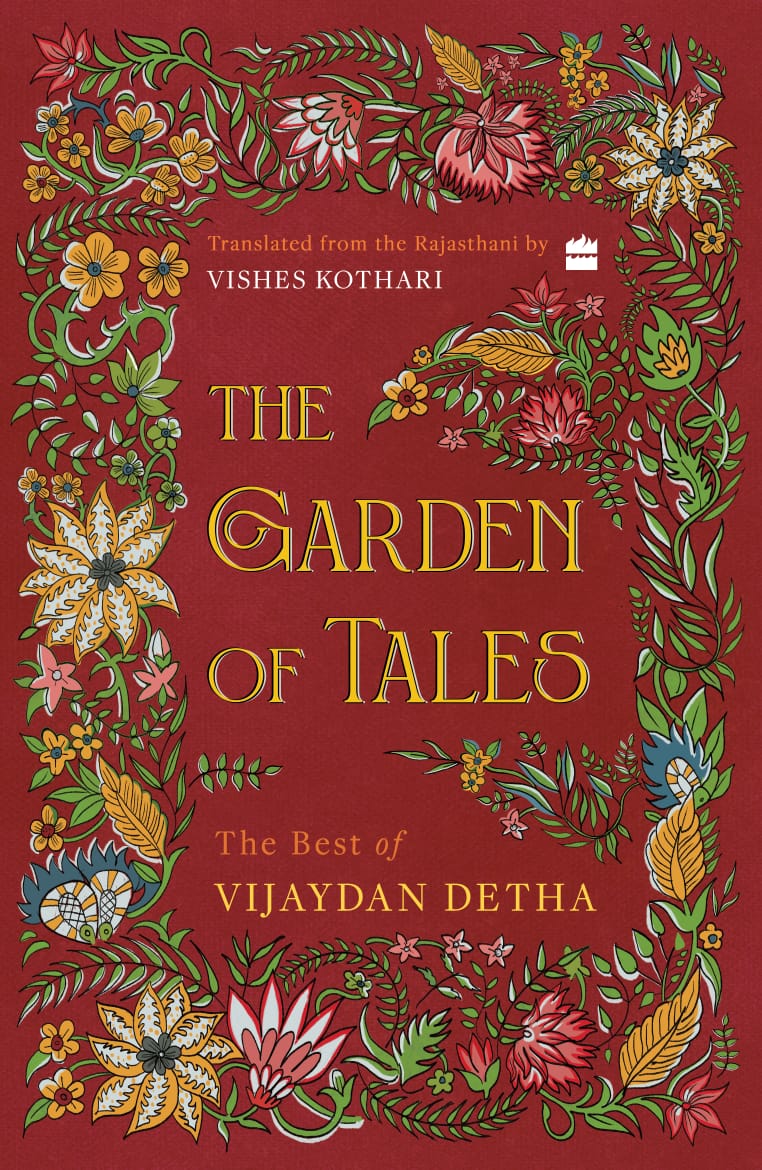Vishes Kothari’s translation of Vijaydan Detha’s The Garden of Tales (Harper Perennial, 2023) is a collection that immerses readers in the world of Rajasthan’s common people.
Detha skillfully weaves together folklore and fables, depicting a diverse range of characters and settings. His stories encompass both earthly and cosmic landscapes, featuring humans, animals, elements of nature, and even supernatural beings. Amidst these diverse elements, the tales delve into various aspects of humanity, such as love, desire, innocence, cunningness, wisdom, folly, greed, deceit, righteousness, valor, and the illusory nature of power.
The following are excerpts from the book:

A Note from the Translator
This exercise in translation is to allow readers who cannot read the original texts, glimpses of this world. Which glimpses would be the most representative? How is this world, sustained entirely in the intangible, to be translated? How is this world, sustained entirely in the oral traditions of Rajasthan, to be translated? These are the questions that have constantly been on my mind throughout this process of translation.
The folk traditions of Rajasthan are incredibly diverse. Komal Kothari, the folklorist, drew connections between the sheer amount of movement required to lead a semi- sedentary, semi-migratory lifestyle, and the corresponding richness of oral traditions and memory. Historian Tanuja Kothiyal draws connections between this pastoral and mercantile way of life and the political and ecological realities of this land as a frontier which remained a site of contestation and confluence between many powers and empires.
Sure enough, our traditions of storytelling are incredibly diverse. We have love ballads, religious stories, origin myths, fables for children, didactic tales, stories narrated at gatherings for entertainment. Many of these ‘folk tales’ also appear in older handwritten manuscripts – some in the form of the traditional ‘baat’ prose literature, while others appear in the collections of stories used by monks in their sermons. Even though the ‘storylines’ might be traditional, it is Detha who cast them into the form of the modern short story. I have tried to include the best examples of each of these types. Of course, there are those stories that instantly identify themselves as classics – ‘Aasmaan Jogi’, ‘The Creed of Crows’, ‘The Truthful Thief’ – not much thought was needed to include these in the collection.
Bijji – as Detha is fondly known – had a deep sense of anguish about the deprecated status of Rajasthani in modern India. Kept out of the 8th Schedule of the Constitution, the language has not been afforded any right to official existence, despite having its own very developed literary traditions and Sabadkos (dictionary), and despite continuing to be the language spoken throughout much of Rajasthan. Bijji regarded Anton Chekhov, Sarat Chandra Chatterjee and Rabindranath Tagore, all of whom wrote in their mother tongues, as his gurus. Like his gurus, he decided that he would also write in his mother tongue – a radical choice for his time.
[…]
Power
Without anyone leading them or telling them anything, the crowd’s feet, accustomed to their ways for ages, turned towards the new kaji’s home on their own. The mind, whose job it is to think, did not have to think at all.
The new kaji was lost in thought over some quandary, when, suddenly, hearing a commotion, he stepped outside. As soon as his eyes fell upon that gleaming golden cage, he was stupefied, but recovered in an instant. The nectar-like chants of ‘khamma ghani, khamma ghani’ began to swirl in his ears. How wrong he had been to ever doubt or be annoyed with such devoted and clever people! Not a single person turned their face towards the forlorn mansion of the dead Kaji. No one even asked after the well-being of those mourners who had indulged in the drama of wailing. How could such a sincere lot utter any falsehoods, pray tell?
It is the misfortune of the dead Kaji that, as soon as I started to write about his burial, my pen ran out of ink! But I have full faith in the intelligence of my virtuous readers…




